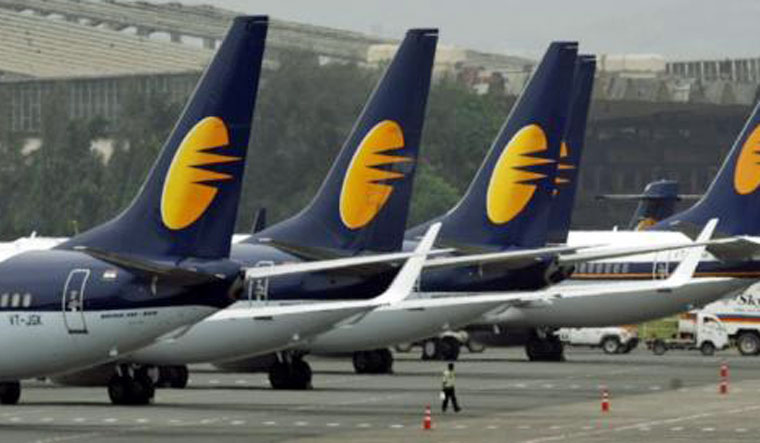India is among the fastest growing aviation markets in the world, with low penetration levels opening huge growth opportunities. Yet, India's airline companies are struggling in the wake of strong headwinds in the form of a sharp rise in oil prices and a depreciating rupee.
Companies, though, remain reluctant to raise prices in the wake of a fierce competition from low cost carriers, which in turn has forced them to look inwards in rationalising their existing network, look at cost and revenue management as well as seek newer fuel efficient planes. Yields of the companies have also come down due to rapid increase in capacity as airline companies take delivery of newer aircrafts.
Among the most impacted airline is the full service carrier Jet Airways. The country's second largest airline in terms of market share reported a consolidated net loss of Rs 1,261 crore in the quarter ended September 30. In the April-June quarter, it had a loss of Rs 1,326 crore.
The airline's gross debt at the end of September stood at Rs 8,411 crore and while it has been current in its payment obligations to banks, Amit Agarwal, the deputy CEO and CFO of Jet Airways, admitted that amid liquidity constraints, payments have been delayed to vendors and a section of its employees. He added that 85 per cent of its employees were being paid on time and that the staff had been supportive so far.
Tata Sons is reportedly in talks with the Jet Airways for a stake acquisition, while US-based Delta Airlines has also been linked with a potential deal. Agarwal wouldn't comment on what he termed as speculation, only reiterating that the company had been scouting for fresh equity infusion.
“We are looking at sale of aircraft, fresh equity infusion and monetisation of JPPL (Jet Privilege, its loyalty and rewards programme). We have put six (Boeing) 777 aircraft for sale and lease back,” Agarwal said in a conference call with investors on Tuesday.
The company is also undergoing a comprehensive update of its network, officials added. As of part of these plans, Jet Airways is increasing capacity too, and operations from tier II centres like Indore. It will rationalise operations on uneconomic routes, deploying these assets to more productive routes domestically as well as in its international operations, said Vinay Dube, CEO of Jet Airways.
“The opportunities in India are staggering. But challenges are also staggering. The current fares in the market are unsustainable and it is imperative that prices go up. We have absolutely no desire to engage in a fare war,” Dube observed.
He further stated that the airline's business turnaround was on track and its cost reduction efforts were bearing fruit. The airline is banking on the delivery of new fuel efficient Boeing 737 Max planes, to drive 8-10 per cent compounded growth in the long-term.
Jet Airways has ordered 225 such planes, of which five have been delivered so far, and six more will be inducted by March and 15 more in the next financial year. Progressively, it will replace the older Boeing 737 Jets by 2025.
Jet Airways is not the only Indian airline company caught in a turbulence. Its bigger rival and the country's largest low-cost carrier IndiGo reported a net loss of Rs 652 crore in the July-September quarter, its first loss since it got listed three years ago. Rahul Bhatia, the co-founder of IndiGo, also blamed high fuel costs, which constitute over 40 per cent of its total costs, and low fares for its losses. However, providing low fares will still be a key customer-focused strategy, it said.
“We continue to be focused on a very simple model of providing low fares, hassle free service and on-time service. And we think that the strategy is resilient and will remain in place. Our long-term plan is to build a world-class network through the country. And the pieces of that are being put in place quite rapidly,” said Greg Taylor, senior advisor at IndiGo.
The airline now has 100 daily departures from six metro cities—Mumbai, Delhi, Bengaluru, Kolkata, Hyderabad and Chennai. It also now covers 1,300 city pairs via non-stop and one-stop flights.
IndiGo is also adding the new fuel efficient Airbus A320 Neo aircraft, which will help save costs over time. The majority of its aircraft additions will also be on the sale and lease back model, although it also intends to own some of its planes, based on the free cash it generates.
IndiGo's low cost rival SpiceJet, which is yet to announce second quarter earnings, had reported a net loss of Rs 38 crore in the April-June quarter. This was the airline's first loss in 14 quarters.
Centre for Asia Pacific Aviation (CAPA) in its mid-year outlook had said that near-term risks and losses of Indian airline companies were expected to increase and airlines will need to adjust to a new normal of higher costs and excess capacity. The consulting firm has revised its forecasts and now expects India's consolidated airline industry to post a loss of $1.65 billion to $1.90 billion in the year-ending March 2019. It had earlier forecasted a loss of $430 million to $460 million.
“Airlines have completely lost pricing power as a result of the rapid influx of capacity. Given the pace of aircraft inductions over the coming months, yields will likely remain at levels, at which domestic profitability is elusive,” said CAPA India.
Despite the headwinds, it doesn't see the industry heading into a downward spiral given that domestic traffic is expected to grow 18-20 per cent and international traffic is seen growing 10-12 per cent this year.
CAPA added that if cost pressures were to intensify, the situation could be “exacerbated” as Indian carriers are scheduled to take delivery of around 500 aircraft over the next five years.
“Simultaneous high fuel prices, peak deliveries, airport (capacity) constraints and pilot shortages would be a very challenging combination,” CAPA said.



